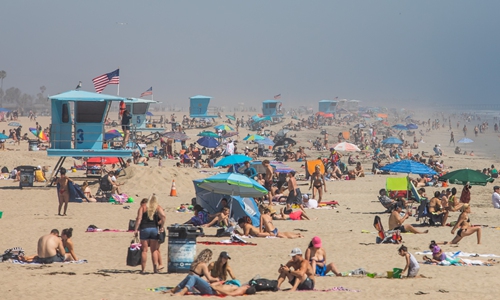Fatalities surpass 200,000
Source:AFP Published: 2020/4/26 20:08:40
WHO against ‘immunity passports’ as reinfection possible

People enjoy the beach amid the COVID-19 pandemic at Huntington Beach, California on Saturday. Orange County is the only county in the area where beaches remain open, and lifeguards at Huntington Beach expected tens of thousands of people to flock the beach from April 18 to 19 due to the heat wave. Photo: AFP
The global death toll of the novel coronavirus pandemic soared past the grim 200,000 milestone on Sunday, as the World Health Organization (WHO) warned against "immunity passports" for recovered patients, seen as a possible tool for countries preparing to reopen their economies.
The WHO opposes such "passports" because recovery from the virus might not protect a person from reinfection.
"There is currently no evidence that people who have recovered from COVID-19 and have antibodies are protected from a second infection," the UN health body said in a statement.
Meanwhile hundreds of millions of Muslims around the world spent the second day of the Ramadan holy month out of mosques, avoiding large family meals to break the fast because of sequestration and social distancing policies.
Australians and New Zealanders also marked Anzac Day without the normal parades and public ceremonies to commemorate fallen soldiers. Instead, under social distancing policies, people held dawn vigils in front of their homes.
Even as governments from Sri Lanka to Belgium and the US began moving in the direction of partial reopening, the COVID-19 pandemic still had nearly half of humanity under some form of lockdown or confinement.
Total cases around the world rose to 2.91 million and deaths passed the 200,000 mark, doubling since April 10, according to an AFP tally.
Europe, the hardest-hit region, has recorded 122,171 coronavirus deaths.
The world remained in wait as companies and governments raced to develop treatments and, eventually, a vaccine for the virus.
The WHO warned on Saturday that people who test positive and survive infection cannot be certain that they will not be hit again by the virus.
The warning came as some governments study measures, such as "immunity passports," for those who have recovered from the disease as one way to get people back to work after weeks of economic shutdown.
People holding such a "passport" may tend to ignore public health advice, such as continuing to wear face masks, assuming they are not a danger to themselves or others, the WHO said.
That is a particular worry as testing becomes more widespread, especially testing for coronavirus antibodies, whose presence indicated a person had previously contracted the virus and recovered.
"If I've already had corona then I'm not infectious," said Berlin resident Lothar Kopp, hoping to test positive for antibodies as it could allow him to visit his elderly mother.
AFP
Posted in: CROSS-BORDERS,EYE ON WORLD